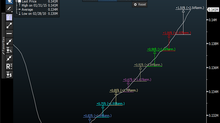What Makes a Recession?
Some years ago, I wrote a piece called "When Does GDP Matter?" The issue is coming up again, because many define a recession as two consecutive quarters of negative GDP, which may occur this year. However, that rule of thumb, invented in 1974, has given way to a more flexible interpretation. And the reason is, as I pointed out in the piece, is that GDP alone doesn't tell you much about the state of the general economy.
As an example, I used the 4th Quarter GDP of 2015. Looking at the chart, where it seems GDP growth went missing during this period, you would think the economy was barely breathing.

But the economy was actually doing quite well. Unemployment was continuing to fall in 2015, from 5.7% to a flat 5.0%, and would continue to trend down from there. Auto sales bumped against all time highs for the entire year, at a seasonally adjusted annual rate of almost 17 million units. Thanks to the fracking boom, energy was cheap and plentiful. Gasoline prices ranged from $2.03 to $2.83 per gallon. By this time, over $5 trillion in mortgages were refinanced at ultra low interest rates, saving homeowners billions a month. Things were good and getting better.
But we have a somewhat similar situation now, in that employment is robust, people are traveling, the auto market is strong, and would be stronger still were it not for supply constraints that have dogged production.
So while the Fed is trying to slow things down, and some GDP predictions are signaling a recession, it hardly means that a bad time for workers and companies is in the offing. Earnings for the 2nd Quarter are tempered, but in the main, holding up well.
That's not to say the Fed's actions are not having an effect in certain areas. There's been a backup of unsold inventory at major retail chains, for example, and home sales in many areas (but not all) seems to have chilled somewhat. But considering how hot the housing market was before the Fed started throwing water on the fire, that's still not an unhealthy housing market. Just a saner one.
On consumer credit, there is a small spike in car repossessions, but home mortgage defaults remain low. Initial unemployment claims have bounced off their Nixon-era lows, but again, they're back to where we were in the 2016-2019 range, which is still historically low in the post GFC era.
So while there are signs of slowing in the economy, which the Fed wants (and may not be able to fully deal with as long as energy and political instability overseas muddle their efforts) things are not bad out there, despite all the grumbling.
The political narrative is, unfortunately, worse than the reality.
So, when do you know if we've seen a recession? Based on the history, it's when Federal tax revenue sharply declines. Works for me.

7/27/2022













